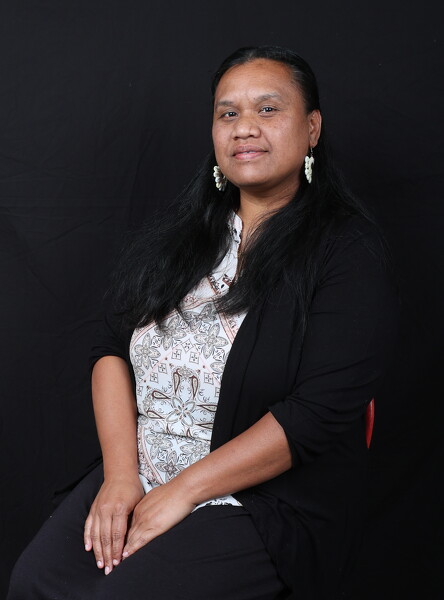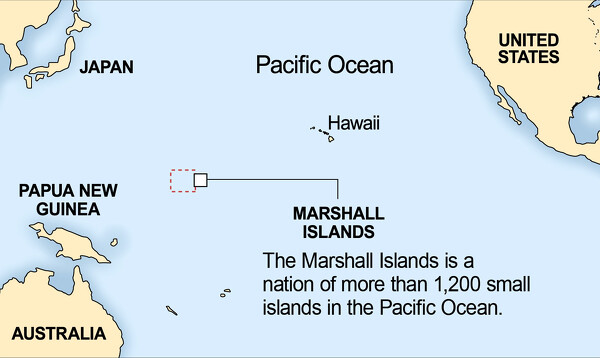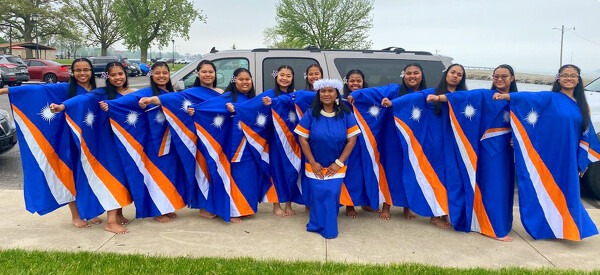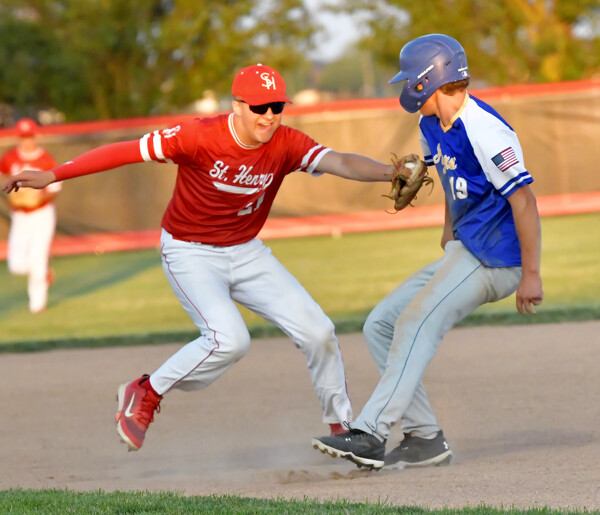
Lydia Lanny, executive director of the Ohio Marshallese Community, was born and raised in the Marshall Islands.
CELINA - Despite being neighbors, coworkers and classmates, there is a language barrier between Celina residents who are U.S. citizens and the Marshallese people who live here, creating a cultural divide and disconnect.
Lydia Lanny, executive director of the Ohio Marshallese Community, wants to create a dialogue between the groups, starting by tackling the language barrier.
Marshallese is one of the official languages of the Republic of the Marshall Islands, a chain of islands and atolls in the Pacific Ocean, according to marshallese.org, a searchable database and dictionary. Marshallese people have been speaking the Malayo-Polynesian language since before the first Western explorers arrived around 1520.
While leading the community organization, Lanny, who was born and raised in the Marshall Islands and now lives in Celina, also works with the Ohio Department of Job and Family Services and Mercer Health, a role in which she acts as a liaison and translator.
If a Marshallese citizen applies for services within JFS and doesn't understand English fluently, Lanny will come in and explain the process.
"They tell me and then I tell them," she said. "I'm like the middleman for Job and Family Services with their programs that they have. I translate for them."
Similarly, she translates and interprets at Mercer Health, because the language often doesn't translate directly to English and important terms can get lost if she were to only translate.
"When I translate, I don't really translate; I interpret because it's easier and it's better for (the Marshallese clients)," she said. "They understand more when you interpret things. A lot of them come straight from the outer islands where education is limited, so basic English is all they know."
A good portion of miscommunication in any interaction between Marshallese locals and other residents can be avoided if the two people involved were to approach each other on a human level, Lanny said.
"If you don't understand them and you tell them, they'll understand why," she said. "From our end, when they're (Marshallese people are) trying to speak English and you (U.S. citizens) don't understand, they would rather have you (explain). If you talk to them in layman's terms and slowly, sometimes then they'll get it. Give them terms that they kind of would understand."
For example, if someone were trying to arrange lunch at Celina Wine Store, a Marshallese person might not understand "Celina Wine Store" as a location, but they would probably know it as a drive-through establishment by Dollar General on Logan Street.
"Instead of giving them exactly what it is, if they don't understand, try to give them something else right next to it," she said.
Lanny emphasized that Marshallese people are "very nice, very humble people," but because they are the minority in the area, they can feel excluded.
As an example, Lanny said if a Marshallese person applies for an apartment and is denied, "the first thing a Marshallese (person) would say is it's because (they're Marshallese), when it's not," she said. "It's probably something else. But to them, it is. That's what the organization (Ohio Marshallese Community) is for, trying to educate our Marshallese community. Hey, it's an equal opportunity for everyone. You being denied is not because of the color of your skin. It could be several other things ... You have a lot of opportunities here in Celina. Get out there and get those opportunities. But then they're so reserved because they're like, 'Oh, I don't speak that well in English. If they don't understand me, they won't hire me. If they don't understand me, they won't give me the medical care I need. If they don't understand me, I won't get the education I need. If they don't understand me, I can't get the help that I need.'"
OHMC is a local nonprofit organization dedicated to supporting education and health and social services. The organization, run by seven board members, promotes Marshallese cultural values, traditions and history to "facilitate intercultural dialogue to foster positive social change," per a news release. The group was founded in 2023, and Lanny became executive director shortly thereafter.
According to Lanny, there are about 3,000 Marshallese people in Ohio, with most of them living in Mercer and Auglaize counties.

The Marshall Islands is a nation of more than 1,200 small islands in the Pacific Ocean.
In 1914, Japan captured the Marshall Islands and built military bases. In 1944, U.S. Marine and Army forces defeated Japanese troops on both the Kwajalein and Enewetak atolls, according to the Atomic Heritage Foundation. The islands passed formally to U.S. control after the war.
Between 1946 and 1958, the United States tested 67 nuclear weapons on the Enewetak and Bikini atolls within the Marshall Islands, which had a population of 52,000 at the time, per the foundation.
The United States conducted its largest nuclear detonation ever, Castle Bravo, at Bikini Atoll on March 1, 1954. According to the PBS history series "American Experience," scientists had grossly underestimated the size of the explosion. What they thought would yield the equivalent of 5 million tons of TNT actually yielded 15 megatons - making it more than 1,000 times bigger than the bomb dropped on Hiroshima.
A Columbia University study in the journal Proceedings of the National Academy of Science said Castle Bravo, coupled with an unexpected easterly wind, resulted in substantial radioactive fallout on Rongelap and Utirik atolls, where no evacuation was implemented. The study, published in 2016, found the Bikini Atoll, Naen, and two islands in the Enewetak Atoll, Runit and Enjebti, had radioactive plutonium levels higher than those found in Fukushima, Japan, and Chernobyl, Ukraine, following major nuclear accidents.
"When they did that testing, they didn't think about the impact afterward," Lanny said. "This is from my own opinion; I felt like the Americans back then didn't really know the effect of it until afterward, but then even afterward, they weren't really told the truth. That's why we have our compact with the United States where we can come here freely without visas or anything like that. That's the agreement between the Marshall Islands and the United States. It was just because of that nuclear testing."
As an apology, in 1986 the U.S. recognized the independence of the RMI and the two countries signed the Compact of Free Association, which granted the RMI political independence and allows Marshallese citizens to work and go to school in the U.S.
The compact allows Marshallese residents to come to America as legal non-immigrants. As such, they are not U.S. citizens and can't vote, but do get an identification card, a Social Security card and can tap into benefits and Pell Grants while getting an education and finding employment.
"We're not U.S. citizens; we're not U.S. nationals. We are legal non-immigrants because we're not immigrants. We didn't migrate here," Lanny said.
The U.S. also is responsible for the defense of the RMI, and is permitted to conduct military maneuvers and testing on Kwajalein Atoll. The compact also ensures the U.S. provides medical care for the remaining 176 Marshallese people directly affected by the Castle Bravo test.
Lanny noted she's never seen a formal, written apology for the explosions.
"The apology was the compact funds that we get, basically," she said. "I've never seen anything in writing, like a formal apology."
Lanny said Marshallese people began moving to Ohio when one person came to go to college in Columbus. He brought his family. She isn't certain why Celina became a prominent location, but she thinks manufacturing jobs available at companies like Cooper Farms, Basic Grain, Verspak, and Opus Packaging were a deciding factor.
Lanny hopes better communication and mutual understanding can bring Marshallese and non-Marshallese populations closer together.
Tensions escalated in November 2024 following a contentious St. Marys City Council meeting in which former city councilwoman Judy Weng raised concerns about Marshallese citizens purchasing a St. Marys church.
Weng alleged without evidence that Marshallese residents in Celina are using churches as homes and that the St. Marys church on Holly Street was purchased to be used as home for a large group of Marshallese citizens.
She added that the residents work in industries in Celina, St. Henry, Coldwater and surrounding areas. Much of the concerns raised by Weng conflated Marshallese citizens with the thousands of Haitian immigrants that have legally settled in recent years in Springfield.
Lanny said it is customary during a Marshallese funeral to stay overnight in the church to pay respects.
"When that came out, a lot of the Marshallese folks were calling us, calling the organization, the board members," she said. "They're saying, 'Hey, what are you guys doing? They're saying so much stuff about us.'"
"The sad thing about it is (the commenters at meetings) weren't educated," Lanny said. "They're comparing us to the Haitians when we're totally two different countries. Different types of people, different cultures, different language."
A few months later, following President Donald Trump's inauguration, large-scale U.S. Immigration and Customs Enforcement (ICE) arrests began, and Marshallese people were terrified they could be evicted and deported.
"Working for a nonprofit organization and dealing with a community like this, it has its hardships," Lanny said. "You try to tell people, 'Hey, don't worry about it.' The only reason (ICE would come after them) is if they are repeat offenders with hardcore crimes."
Lanny said she's fielded calls from Marshallese residents who are scared they will get deported because of something as small as a parking ticket.

Marshallese people perform a flag dance during a celebration for Marshall Islands Constitution Day on May 26.
Emotions flared further when the community celebrated Marshall Islands Constitution Day on May 26, which fell on the same day as Memorial Day.
"We just had our Independence Day, and we sent out invitations to a whole bunch of different entities," Lanny said. "Not a lot of people came. When that happened, our people went, 'Is it something we did? Why didn't the (Celina) mayor come?' The St. Marys mayor didn't come either."
Still, Lanny said she recognizes the celebration was on Memorial Day - and city officials may have had other plans.
"It's not just language," she said. "Yeah, you learn the language, but you also have to understand the culture."
That's where her nonprofit comes in - promoting the cultural values, traditions and history of the Marshallese people to facilitate intercultural dialogue and foster positive social change.
To learn more about Ohio Marshallese Community, email ohiomarshallesecommunity@gmail.com.
